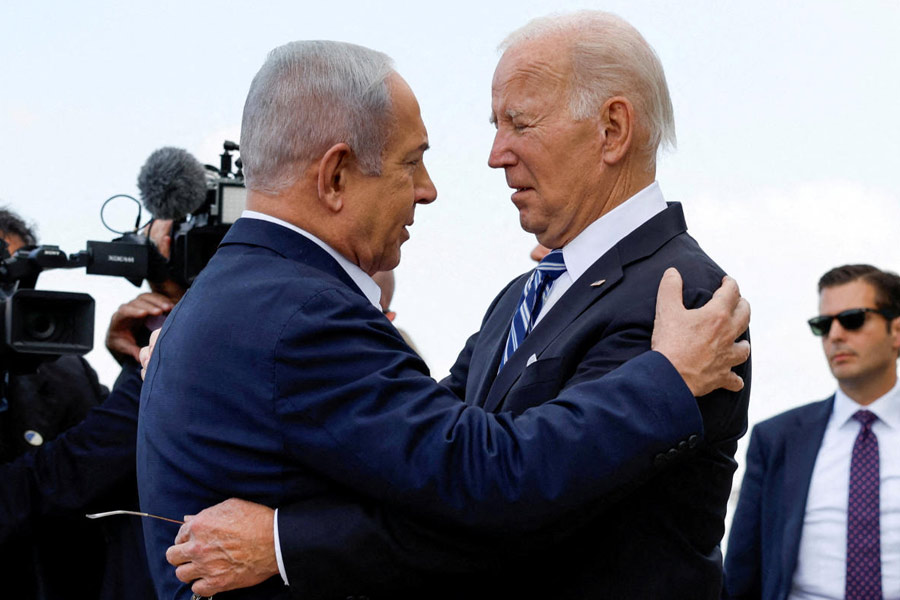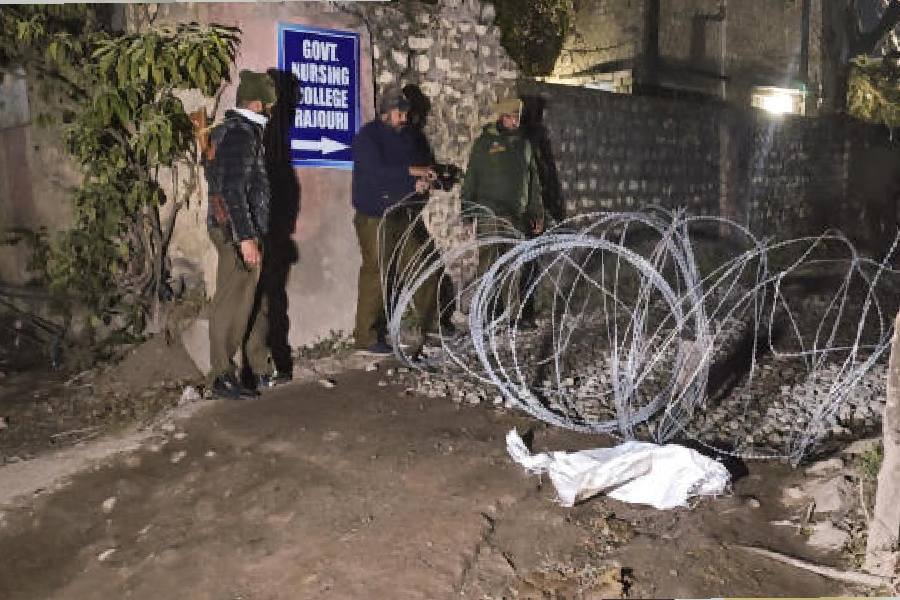Israeli Prime Minister Benjamin Netanyahu defended Israel's ongoing war in Gaza and condemned American protesters in a scathing speech to Congress Wednesday that triggered boycotts by many top Democratic lawmakers and drew thousands of protesters to the Capitol to condemn the war in Gaza and the humanitarian crisis it has created.
Nine months into the war in Gaza, Netanyahu vowed to press on with the war until “total victory.” He also sought bolster U.S. support for his country's fight against Hamas and other Iran-backed armed groups, and bitterly condemned widespread opposition in the United States to the war.
“America and Israel must stand together. When we stand together something really simple happens: we win, they lose.” said Netanyahu, who wore a yellow pin expressing solidarity with the Israeli hostages held by Hamas.
Netanyahu's speech quickly took on a darker tone as he defended his country but also derided those protesting the war, gesturing to demonstrations happening as he spoke on the streets outside the U.S. Capitol, as “useful idiots” for Israel's adversaries.
He drew shouts of applause from many in Congress, but also silence from leading Democrats who declined to stand and cheer.
Freed former hostages of Hamas and families of hostages listened in the House chamber as Netanyahu spoke. Lawmakers of both parties rose repeatedly to applaud the Israeli leader, while security escorted out protesters in the gallery who rose to display T-shirts with slogans demanding that leaders close a deal for a cease-fire and the release of all hostages.
A weeping Rep. Rashida Tlaib, a Michigan Democrat, held a sign in the House chamber that says “war criminal.”
Netanyahu accused the numerous protesters of the war in the United States of standing with the militants who he said killed babies in Hamas' attack on Oct. 7. “These protesters that stand with them, they should be ashamed of themselves," he said.
With criticism against him rising in Israel, too, Netanyahu also aims to portray himself as a statesman respected by Israel's most important ally. That task is complicated by Americans' increasingly divided views on Israel and the war, which has emerged as a key issue in the U.S. presidential election.
Tall steel barriers ringed the Capitol Wednesday, and police deployed pepper spray as thousands of protesters rallied near the Capitol, denouncing Netanyahu as a “war criminal” and calling for a cease-fire.
Netanyahu received a warm welcome from House Speaker Mike Johnson and other Republican lawmakers who arranged his speech in the House chamber. “Today and every day, America must stand shoulder to shoulder with Israel,” Johnson said shortly before Netanyahu began speaking. He received a bipartisan standing ovation.
Noa Argamani, an Israeli hostage who was freed in a rescue mission in Gaza, was in attendance.
The appearance makes Netanyahu the first foreign leader to address a joint meeting of Congress four times, surpassing Winston Churchill.
More than 50 Democrats and political independent Bernie Sanders boycotted Netanyahu's speech. The most notable absence was right behind him: Vice President Kamala Harris, who serves as president of the Senate, said a long-scheduled trip kept her from attending.
The next Democrat in line, Sen. Patty Murray of Washington, declined to attend, so Sen. Ben Cardin, the chair of the Senate Foreign Relations Committee, served as “senator pro tempore” in place of her.
Rep. Rashida Tlaib, a Michigan Democrat who has family in the West Bank, sat in the House chamber with a keffiyeh, which she often wears, wrapped over her shoulders. Tlaib was censured last year for her strident criticism of Israel's conduct in the war.
Republicans said the absence of Harris, the new Democratic front-runner for the presidency, was a sign of disloyalty to an ally. Former President Donald Trump's running mate, JD Vance, was also a no-show for Netanyahu's speech, citing the need to campaign.
Netanyahu is scheduled to meet with President Joe Biden and Harris on Thursday, and with Trump at Mar-a-Lago on Friday.
Many in the swelling crowds of demonstrators protested the killings of more than 39,000 Palestinians in the war. Others condemned Netanyahu's inability to free Israeli and American hostages taken by Hamas and other militants during the Oct. 7 attack that sparked the war.
Support for Israel has long carried political weight in U.S. politics. But the usual warm welcome for Netanyahu's visits has been diminished this time around by political turmoil, including the assassination attempt against Trump and Biden's decision not to seek another term.
Many Democrats who support Israel but have been critical of Netanyahu see the address as a Republican effort to cast itself as the party most loyal.
Many Democrats attended the address despite their criticism of Netanyahu, including Senate Majority Leader Chuck Schumer, who called for new elections in Israel in a March floor speech. Schumer, of New York, said then that Netanyahu has “lost his way” and is an obstacle to peace in the region amid the humanitarian crisis in Gaza.
About 60 lawmakers met Wednesday with relatives of those taken hostage by Hamas, and they expressed anger toward Netanyahu. “Because by coming here, he risks making himself the issue, turning the humanitarian issue of the hostages into a political one,” Maya Roman, who had several family members taken hostage, told the lawmakers.
The United States is Israel's most important ally, arms supplier and source of military aid. Netanyahu's visit is his first abroad since the war started, and comes under the shadow of arrest warrants sought against him by the International Criminal Court over alleged Israel war crimes against Palestinians. The United States does not recognize the ICC.
The Biden administration says it wants to see Netanyahu focus his visit on helping it complete a deal for a cease-fire and hostage-release. Growing numbers of Israelis accuse Netanyahu of prolonging the war in order to avoid a likely fall from power whenever the conflict ends.
Netanyahu has said his aims for the U.S. visit are to press for freeing hostages held by Hamas and other militants in Gaza, to build support for continuing Israel's battle against the group, and to argue for continuing to confront Hezbollah in Lebanon and other Iranian-allied groups in the region.
Some Democrats are wary about Netanyahu since he used a 2015 joint address to Congress to denounce then-President Barack Obama's pending nuclear deal with Iran.
Netanyahu used an appearance early Wednesday to focus on Iran, its nuclear program and its network of armed allies. Iran is “behind the entire axis of terror” that threatens the U.S. and Israel, he said, speaking at a memorial for former Sen. Joe Lieberman.











